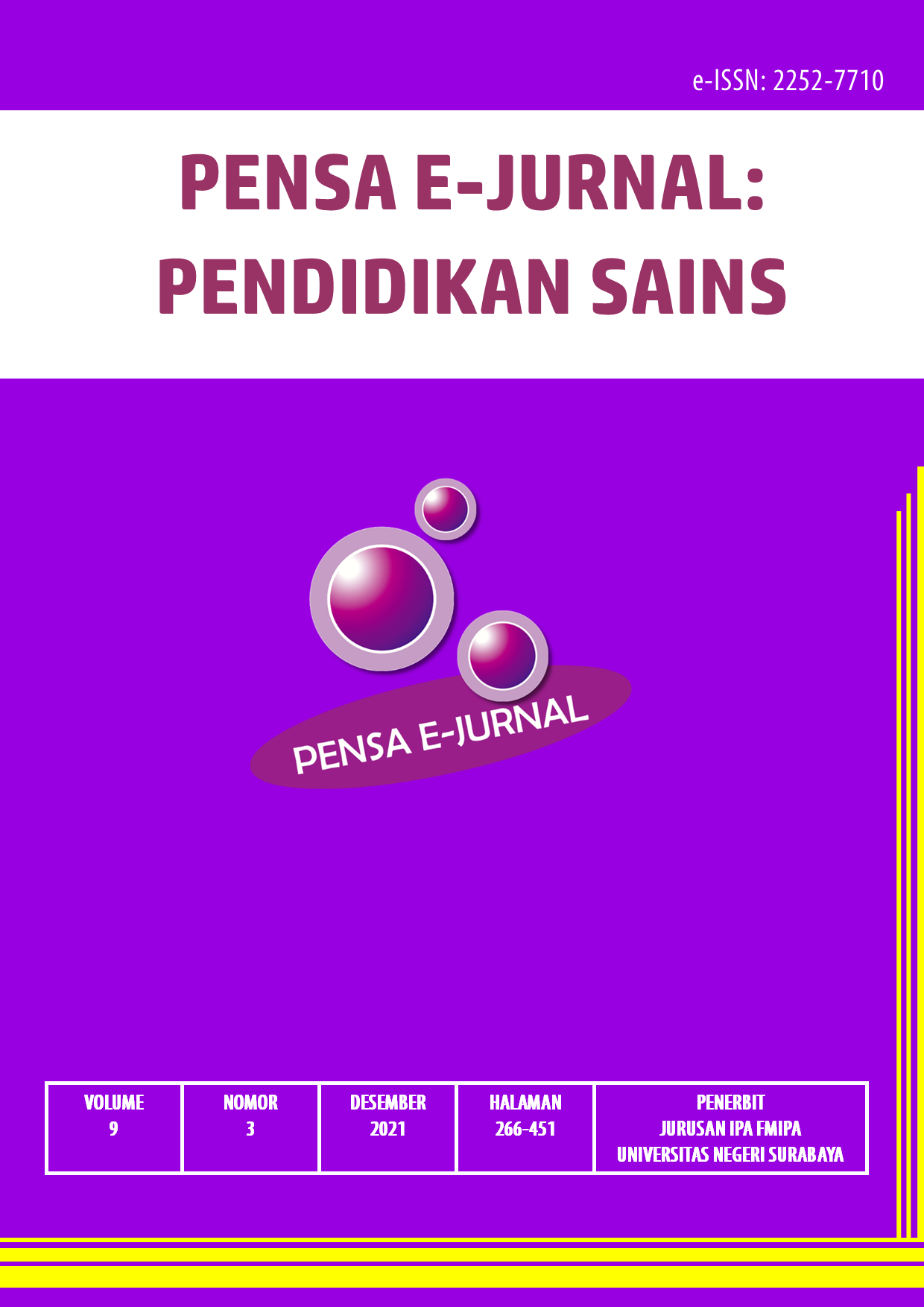SOME CONSTRAINTS IN ACHIEVING SCIENCE PROCESS SKILLS (SPS) IN SECONDARY SCHOOL WATULIMO DURING THE COVID-19 PANDEMIC
DOI:
https://doi.org/10.26740/pensa.v9i3.38707Keywords:
Science process skills, learning constraints, Covid-19 pandemic, case studyAbstract
This study aims to determine the constraints of the achievement of learning Science Process Skills (SPS) in the Covid-19 pandemic. This research used case study method with the research subject 5 science teacher and 15 students from 3 junior high school in Watulimo. The research instrument consisted of a questionnaire of teachers and students, with data collection techniques used were interviews, observation and documentation. The results of the research show that there are constraints derived from internal factors and external factors of the students. In addition there are also constraints that come from the teacher. Some of these constraints affect the low SPS students. Solution for the application of science process skills can be maximally implemented including, 1) the teacher should develop instruments such special student worksheet for assessing science process skills; 2) teachers need to familiarize the application of science process skills in science learning. The results of this study are used as input or solutions for junior high school science teacher against any problems that arise in SPS learning when the learning is online so that students are able to achieve the learning outcomes to the fullest.
Downloads
References
Anugraha, A. (2020). Hambatan, Solusi dan Harapan: Pembelajaran Daring Selama Masa Pandemi Covid-19 Oleh Guru Sekolah Dasar. Scholaria : Jurnal Pendidikan dan Kebudayaan, 10(3), 282-289.
Asmuni, A. (2020). Problematika Pembelajaran Daring di Masa Pandemi Covid-19 dan Solusi Pemecahannya. Jurnal Paedagogy, 7(4), 281. Retrieved from https://doi.org/10.33394/jp.v7i4.2941
Dursun, T., Oskaybas, K., & Gokmen, C. (2013). The Quality Of Service Of The Distance Education. Procedia - Social and Behavioral Sciences, 182, 1133-1151. Retrieved from https://doi.orf/10/1016/j.sbspro.2013.10.441
Gikas, & Grant. (2013). Mobile computing devices in higher education: Student perspectives on learning with cellphones, smartphones & social media. The Intenet and Higher Education, 19, 18-26.
Gokfearslan, S., Mumcu, F. K., Haslaman, T., & Levik, Y. D. (2016). Modelling smartphone addiction: The role of smartphone usage, self-regulation, general self-efficacy and cyberloafing in university students. Computers in Human Behavior. Retrieved from https://doi.org/10.22437/bio.v6i2.9759
Hasruddin, & Rezeqi. (2017). analisis Pelaksanaan Praktikum dan Permasalahannya di SMA Negeri Se-Kabupaten Karo. Jurnal Rabularasa PPS UNIMED, 9(1), 17-32.
Jannah, M., & Junaidi, J. (2020). Faktor Penghambat Guru sebagai Fasilitator dalam Pembelajaran Sosiologi di SMAN 2 Batusangkar. Jurnal Sikola. Jurnal Kajian Pendidikan dan Pembelajaran, 1(3), 191-198.
Karmala, F. S. (2021). Analisis Faktor-Faktor Kesulitan Guru PL dalam Pembelajaran Daring di SMP N 1 Kecamatan Gunuang Omeh. Jurnal Paedagody, 5, 73-78.
Khusnah, L. (2020). Persepsi Guru IPA SMP/MTs terhadap Praktikum IPA Selama Pandemi COVID-19. Science Education and Application Journal, 2(2), 112. Retrieved from https://doi.org/10.20736/seaj.v2i2.291
Korucu, A. T., & Alkan, A. (2011). Differences between m-learning (mobile learning) and elearning, basic terminology and usage of m-learning in education. Procedia - Social and Behavioral Sciences. Retrieved from https://doi.org/10.1016/j.sbspro.2011.04.029
Kwon, M., Lee, J. Y., Won, W. Y., Park, J. W., Min, J. A., Han, C., & Kim, D. (2013). Development and Validation of a Smartphone Addiction Scale (SAS). PLoS ONE. Retrieved from https://doi.org/10.1371/journal/pone/0056936
Mardianti, S. D. (2021). Factors of decreasing students interest when learning from home. Journal Paedagogy, 1(2), 61-67.
Milman, N. B. (2015). Distance Education. In International Encyclopedia of the Social & Behavioral Science: Second Edition.
Naserly, M. K. (2020). ). IMPLEMENTASI ZOOM, GOOGLE CLASSROOM, DAN WHATSAPP GROUP DALAM MENDUKUNG PEMBELAJARAN DARING (ONLINE) PADA MATA KULIAH BAHASA INGGRIS LANJUT (Studi Kasus Pada 2 Kelas Semester 2. Aksara Public, 4(2), 155-165.
Nurmukhametov, N., Temirova, A., & Bekzkhanova, T. (2015). The Problems of Development of Distance Education in Kazakhstan. Procedia - Social and Behavioral Sciences. Procedia- Social and Behavioral Sciences, 182-85.
Prajana, A. (2017). Pemanfaatan Aplikasi WhatsApp dalam Media Pembelajaran di UIN Raniry Banda Aceh. Jurnal Pendidikan Teknologi Informasi, 1(2), 22-133.
Purwanto, A., Pramono, R., Asbari, M., Santoso, P. B., Wijayanti, L. M., Hyun, C. C., & Putri, R. S. (2020). Studi Eksploratif Dampak Pandemi Covid-19 Terhadap Proses Pembelajaran Online di Sekolah Dasar. Journal of Education, Physiology and Conselling, 2(1).
Putri, H. R., & Sardjito. (2016). Arahan Pengembangan Kawasan Prigi Kecamatan Watulimo Kabupaten Trenggalek Melalui Konsep Minapolitan. Jurnal Teknik ITS.
Sadikin, A., & Hamidah, A. (2020). Pembelajaran Daring di Tengah Wabah Covid-19. Biodik, 6(2), 109-119. Retrieved from https://doi.org/10.22437/bio.v6i2.9759
Saleh, S. Y., Muhiddin, N. H., & Rusli, M. A. (2020). Studi Keterampilan Proses Sains (KPS) Peserta Didik Kelas VIII SMP Negeri 12 Makasar. Jurnal IPA Terpadu, JIT, 3(2), 75-86.
Sayekti, I. C., & Kinasih, A. (2018). Kemampuan Guru Menerapkan Keterampilan Proses Sains Dalam Pembelajaran Ipa Pada Siswa Kelas Iv B Sdm 14 Surakarta. Profesi Pendidikan Dasar, 1(1), 93. Retrieved from https://doi.org/10.23917/ppd.v1i1.4464
Siddiqui, S., & Singh, T. (2016). Social Media its Impact with Positive and Negative Aspects. International Journal of Computer Applications Technology and Research. Retrieved from https://doi.org/10.7753/ijcatr0502.1006
Sugiyono. (2015). Metode Penelitian Kualitatif. Bandung: Alfabeta.
Susanto, A. (2016). Teori Belajar dan Pembelajaran di Sekolah Dasar. Jakarta: Kencana Suwendra.
Susanto, A. (2016). Teori Belajar dan Pembelajaran di Sekolah Dasar. Jakarta: Kencana Suwendra.
Syah, R. H. (2020). Dampak Covid-19 pada Pendidikan di Indonesia: Sekolah, Keterampilan, dan Proses Pembelajaran. SALAM: Jurnal Sosial dan Budaya Syar - I, 7(5). Retrieved from https://doi.org/10.15408/sjsbs.v7i5.15314
Yin, R. K. (2017). Case Study Research and Applications. Thousand Oaks CA: Sage Publications.
Zhafira, N. H., Ertika, Y., & Chairiyaton, C. (2020). Persepsi Mahasiswa Terhadap Perkuliahan Daring Sebagai Sarana Pembelajaran. Jurnal Bisnis dan Kajian Strategi Manajemen, 4(1).
Downloads
Published
How to Cite
Issue
Section
 Abstract views: 171
,
Abstract views: 171
, PDF Downloads: 143
PDF Downloads: 143

















